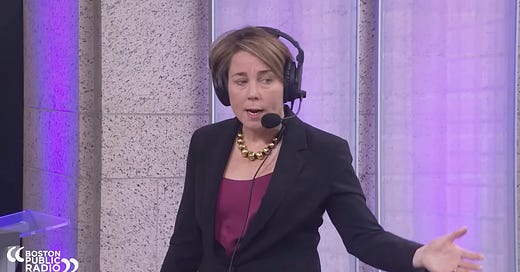Healey administration says it won’t release records from past governors
The decision means records about the Baker administration’s response to COVID and other issues are off limits

Massachusetts Governor Maura Healey’s administration said Monday that it will not release records from past administrations. The decision means that a vast amount of vital information about state government — including former Governor Charlie Baker’s response to the COVID-19 pandemic, the repeated safety problems at the Massachusetts Bay Transportation Authority, and the sprawling overtime-fraud scandal at the State Police — will remain secret.
In December, just two weeks before Healey’s inauguration, she told GBH that she would not claim her office was exempt from the state’s public records law. But shortly after taking office, she reversed herself, issuing a policy that cites the same court decision used by past administrations to withhold records.
The policy says that Healey will “provide more transparency” than past governors and respond to records requests, but adds that her administration will take into account “any unique obligations of the Governor’s Office” when deciding whether to release records.
The Healey administration’s case-by-case approach to records requests is the same one taken by past administrations, which have relied on the Supreme Judicial Court’s 1997 Lambert ruling to claim a total exemption from the public records law.
In response to my records request for Baker administration emails containing the phrases “police” and “law enforcement,” Healey records access officer Michael Kaneb declined to provide any records.
“Governor Healey’s public records policy for the Office of the Governor became effective January 5, 2023, but it does not apply retroactively to the records of previous administrations that operated under different policies,” Kaneb wrote.
The written policy on the state’s website does not say anything about records from previous administrations being off limits.
The policy also does not specify any of the governor’s “unique obligations” that would lead the administration to withhold records. Asked about the lack of an explanation, Healey press secretary Karissa Hand said: “As we learn from experience, if we have more guidance to share, we will do so.”
I filed an appeal with the supervisor of public records, the state’s public records watchdog who is appointed by Secretary of the Commonwealth William F. Galvin.
It appears to be the first appeal involving the Healey administration. No other appeals involving the governor’s office from this year are listed on the secretary of the commonwealth’s website.
Debra O’Malley, the spokeswoman for the secretary’s office, said in January that the supervisor of public records will open appeals related to the governor’s office, adding that “the supervisor’s office has not always agreed with the governor or the attorney general about the application of the Lambert decision.”
In 2017, then-Supervisor of Public Records Rebecca Murray took the position that the Baker administration was not totally exempt from the law. However, the attorney general’s office, which was then headed by Healey, declined to enforce Murray’s order in court.
The current supervisor, Manza Arthur, who was appointed in July, has yet to issue any decisions related to the governor’s office.
Hand declined to say whether Healey is committed to complying with decisions from the supervisor.
Currently, there are three bills before the Legislature that would address the governor’s exemption from the public records law. Only one of them would open up records from past governors to public scrutiny.
A bill filed by Senator Michael Brady would apply the law to the governor’s office but would only take effect after Healey’s current term ends and would not apply to records created before then. The bill has the support of Galvin.
Another bill filed by Senator Jamie Eldridge would apply the public records law to the governor and would apply to all records created since Healey took office. Eldridge’s bill also includes a number of changes to make the Legislature more transparent, like requiring the body to post committee votes online and provide copies of written testimony on request. However, the bill would not apply the public records law to the Legislature, which is also totally exempt.
Another bill filed by Senator Becca Rausch would apply the law to the governor’s office and Legislature and would not be limited to newly created records. The bill would also create two new exemptions. The first would apply to communications with constituents. The second would apply to documents related to policy-making discussions; it would be more expansive than a similar exemption that already exists but would only apply to the governor’s office and Legislature.
In January, GBH’s Jim Braude asked Healey whether she intends to file her own legislation to subject her office to the public records law.
“I don’t think I need to file legislation,” Healey responded. “I think that I can just implement along the lines that I’ve articulated. And that’s what I’m going to do.”
With the new legislative session underway, now might be a good time to look up your legislators and urge them to support expanding the scope of the public records law.
If you’d like to read more reporting like this, please consider supporting my work financially, either by signing up for a paid subscription to this newsletter or sending me a tip via PayPal.
If you have any story ideas, let me know about them! You can email me at aquemere0@gmail.com or send me a direct message on Twitter or Mastodon.
That’s all for now.



